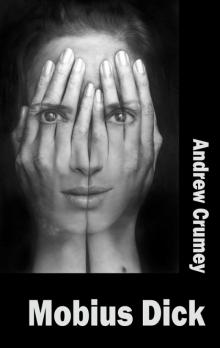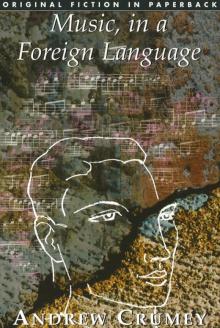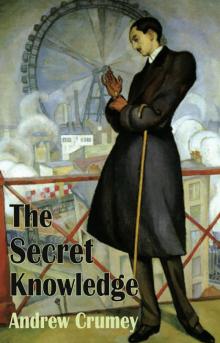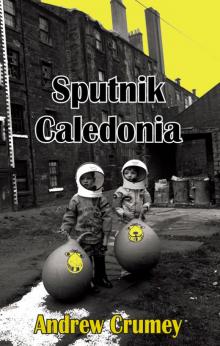- Home
- Andrew Crumey
Music, in a Foreign Language Page 3
Music, in a Foreign Language Read online
Page 3
‘Oh, I’m sorry. He must still have been quite young.’
‘Thirty-two. I can show you a picture of him.’
Duncan shifted in his seat to reach the wallet from his trouser pocket, and he pulled out a small photograph in lurid colours, creased and cracking at the edges. Giovanna took it from him, and saw three people standing in front of a white car; two men with a woman between, in a cream coloured dress – not very flattering. And in front of her a small boy. The sky looks an unnatural and poorly developed blue – it was a sunny day. The two men smiling uneasily, the woman a little stern. Some trees, and to the side of the car a suggestion of flat open landscape beyond the road.
‘Is this you? The little boy? Oh, you were very pretty! And this man here – is he your father?’ She pointed to the taller of the men, who stands close beside the woman.
‘No, the other one. That one you’re pointing at is the chap whose flat I live in now – he’s called Charles King. They were close friends.’
‘What was your father called?’
‘Robert. Robert Waters.’
‘And who is the woman? Your mother? She looks a little sad. I can see you’ve got her eyes. You don’t look so much like your father, though.’
‘You think so? I reckon I look more like him than I do my mother. I’ve got his chin.’ Duncan leaned closer to look at the photograph. ‘This picture got taken only a few weeks before he died. That’s the car he was in.’
‘What a shame. He looks very clever.’
‘He was. He was an historian.’
‘And the one you live with now – what does he do?’
‘Charles? He’s a physicist. Lectures at the university. I suppose it was his wife Joanna who took the photograph.’
‘I can see a bit of her shadow – look here; on the road, at the bottom. That’s her head. She had the sun behind her.’
Had the sun behind her. Though it was not Joanna who took the photograph, but Jenny – a girlfriend whom Charles abandoned soon afterwards. And although Duncan had tried to find out the truth about his father’s death – and had been to London to check the records, now that everything was open to the public – he had learned nothing new. He still didn’t know about Jenny, or the affair, or the chain of fear and mistrust which had led his father’s car through a barrier and down a long ravine, twenty years earlier. He still knew nothing – he was still little more than a child, in a creased photograph.
3
For another five months Giovanna does nothing. Her job bores her – Franco bores her. But she stays in the same job, and she still sees Franco, as if there’s nothing better for her to do. She imagines herself an old woman dressed in black. And she tells Duncan none of this, as he quietly returns to his book.
The young waiter left the girl’s diary unread until after he had finished his shift at the cafe and made his way quickly home. The first page began in mid-sentence, as if it were the continuation of another, earlier volume, and at first he could make little sense of what was written in the even, regular hand of the girl; the letters curled and gently sloping. Neat letters, elegant and aloof. Letters of blue ink, set down rapidly. Letters which suggest a sort of urgency, a sort of compulsion. Letters which hold implication, which invite examination. Letters which seem to promise the answer to some question and then begin to suggest the darkening of a thought, the casting of an idea like a shadow. Letters which seem to push towards the light, but then send their roots deeper. Letters which begin to enfold and seem at first warm but then a little cooler, which seem to be there and yet dissolve into something else, and the coalescing into words which are placed in blue ink upon the page – and the spaces between words, and the bridge between the seen and the unseen, between the known and the unknown and the connections, growing like the healing of a wound, like the clotting of blood or the callousing of worn skin; the conspiracy of words and the assembly into sentences which seem observed yet knowing. Sentences which seem meaningless and yet have the weight of another’s guilt, and which bring neither a warning nor a threat but only the confirmation of something previously suspected, and gradually the forming of a pattern, a hierarchy, and the sense that each sentence, each word, each letter of blue ink is not an answer complete in itself but only an indication, a hint, a point where things meet, a point of confluence, of ramification, and each letter, curled and silent, bears witness to a crime and the idea of a crime, and an act of intrusion by someone who begins to feel involved, and who begins to sense the need for escape but has already gone too far; someone who watches me and thinks he is not seen.
I shall run from this cafe without paying, and he will follow me. I shall throw this book to the ground, and I shall escape. He will pick the diary from the gutter, wipe it clean. But he will not yet dare to look inside. He will go back to the cafe, where the other waiter – whom he hates – will laugh at him and tell him that he has already made a date. So he will carry the diary back to his apartment – a small apartment, the sort of apartment a bachelor lives in, the sort of apartment where a woman will occasionally spend the night and then clean the place for him next morning as an act of sympathy, because when she slept with him it was out of another sort of sympathy, because he’s the sort of man who spends most of his time alone lost in daydreams, the sort of man who sees a woman on a bus and pretends to be in love with her when all he wants is to fuck her and if he managed this it would only interrupt his dream, his love of himself and the images which he makes for himself. So he will lie on his bed in his apartment and he will open the diary with a sense of reverence, imagining somehow that this invasion is motivated by respect, and as he continues the intrusion his excitement will turn into anger because little by little he will begin to feel enmeshed, implicated. He will begin to feel that he is not an unseen observer but is himself observed, that he is not the controller of events but is himself controlled; that he is no longer the protagonist but is now a peripheral character who has entered the story of another; of a girl who goes into a cafe and makes a date with a waiter called Luigi – who happens to be a Fascist – and arranges to meet him next day, and she can tell that he doesn’t care too much how it goes except that if he doesn’t get a fuck out of it then he hopes it doesn’t cost him too much, because she can tell that Luigi is that kind of man – the kind of man who likes a fuck more the less effort it takes him to get it, because it flatters him and he needs all the flattery he can get, and it suits the girl’s purpose because to her Luigi is really nothing more than a name – an instruction in blue ink on white paper, and it doesn’t matter much to her whether or not Luigi keeps the date, or what they do together, because he and the girl are themselves arbitrary characters in a story which seems to suggest the possibility of some resolution, of some answer, and yet continues to deny this, and it’s the sort of story which you won’t like if you believe that the world makes any sense, if you’re the sort of person who wants a beginning and a middle and an end, the sort of person who can see a girl on a bus and think she hasn’t seen you and then ride the same bus route for weeks hoping that you’ll see her again, all the while inventing stories in your mind and weaving together the possible middles and possible ends, but still you’ll follow Luigi tomorrow, hoping that he will lead you back into the kind of story you want, you will follow at a distance and you will watch him meet the girl on a corner near the fountain, you will watch Luigi slide his arm around her, which she will neither resist nor encourage, and you will follow them both at a distance, as the only desire you know is the desire to intrude, and you will watch them go to a building three blocks away where you will see her then bring a key from her pocket, Luigi’s arm still across her shoulder, and they will go inside while you stand in the street and watch and torture yourself with your dreams. And after a while she will come out of the building alone, she will look neither to one side nor the other, but she will walk swiftly away, and if you should be able to make your way inside the building she has left, what scene of horror might meet your
eyes? And if you should follow the girl, what other story might she throw at your feet? And if you should catch the girl and discover everything that can be known about her, what profit would there be in that?
But now it is late and you are alone and you know that what you took for love was only a kind of emptiness and what you took for a cafe was only another kind of emptiness and what you take for the emptiness of your flat is only another point in the same vast emptiness, vast and unending, and tomorrow maybe Luigi will die, and perhaps he deserves this, or tomorrow perhaps I will die, or perhaps it will be you, and you will close the book which you took to be a diary and you will go to the open window and look down on the street and although it is full of slow traffic and people mixing like fish in a slow stream, still it will seem to you to be another part of that limitless emptiness, and the narrow street and the people and the traffic will look like a line of letters on a page; letters which move slowly and yet go nowhere; letters which long to connect yet remain alone, letters which form meaningless words without beginning, middle or end. Some are the oppressors, others are the oppressed. Some the hunters, others the hunted.
Again her flat; the television on while the stubble of Franco’s young face moves across her belly, and again there’s the news – again the silent faces of protestors; students in old-fashioned coats, and everything looking grey and dirty but Giovanna closes her eyes while Franco’s stubble still blindly follows the paths of her skin. Only later does she tell him of her dream; to travel – to go and see everything for herself, and to feel a part of history, and his incomprehension only makes her more determined that this is what she must do.
The rain, falling at an angle with the wind. Car beams in the fine drizzle. Cones of white. Approaching the bend.
Next day her boss knowingly asks her why she looks so tired and happy, and she says she wants to take the three weeks leave that’s due to her as soon as possible. He puts up a struggle but only for the hell of it because business is slack and he can easily manage without her in the meantime, and when she suggests he gives her a fortnight plus one week unpaid he moans and shouts and then gives in and is satisfied that he’s won the deal. Ten days later Giovanna is on a plane to England.
If you had been there Duncan, what scene might you have witnessed? Approaching the bend, headlights full beam. Cones of white in the drizzle. The briefcase on the back seat – no – on the front seat; never out of his sight. The fatal manuscript. Perhaps a folder. And if you could have been there, Duncan, what act might have saved him? And if he could have saved himself, what story might he have told?
Then she’s in London – it’s like all the photographs in the library, only more grey. And there are no demonstrations now, no riots. Now they’re renaming everything, rewriting everything, and it’s as if it never happened. And she realizes that the revolution might only be a return to an earlier state of things, which she and the spectacled students are too young to remember.
Across the road, an oil slick or some slippery substance and the car hitting the barrier, then overturning as it makes its way down the hill, rolling and bouncing – crashing heavily in the darkness, and the hillside littered now with the contents of a suitcase – the things, all his things left behind – and the briefcase thrown from the door when it flew open, and the door crumpled under the body of the car, and reappearing as the car turns again, and the briefcase bursting open and the papers flying into emptiness, into drizzle, into grey drizzle, and falling in the wind.
Giovanna approaches St. Paul’s Cathedral, whose baroque outline reminds her of Italy. She gives some money to the beggar at the entrance, then goes inside, and she is surprised by the whiteness; the great empty whiteness of the walls, which seem almost totally without features, until here and there she notices parts of the original fabric and decoration which were saved and incorporated in the restoration. But the plainness makes it look more like a drawing – like an architect’s plan, with thin lines and semicircles pencilled cleanly against the white. She goes and sits on one of the pews, where she can look up into the dome.
And if they hadn’t stolen his papers, Duncan, if they hadn’t destroyed his work, how might things otherwise have been?
And Giovanna looks up into the great emptiness of the dome and she thinks of the young students and the workers and the old people – all of them – taking hold of history and saying yes, now is the time and she thinks about how at every moment things can go one way or another, but sometimes there comes a point when you have to have courage and you have to act, since there will never be another chance.
But London is a disappointing and a depressing place for her; she is saddened by the poverty, and the crime, and in Cambridge once again she is in a make-believe world of buildings reconstructed since the war. On the platform of Peterborough station she watches the train for Leeds come in half an hour late. The windows move past her and she sees the bowed head of a young man who seems to look up and perhaps he sees her. She gets into the carriage and walks along the aisle until she comes to the place where he is sitting reading a book by Alfredo Galli. She sits down opposite him, and they begin a conversation.
4
‘The rewriting of history is not a purely modern preoccupation. Indeed, one could argue that history itself is little more than an accumulation of alterations and amendments; the endless recreating of the past. We need only consider the subtlety of the immediate present, and the infinite malleability of our own perceptions, to realise that the past is a thing without substance, without meaning, unless it is interpreted. And to interpret is to rewrite.’
It is no accident that I chose Duncan to be reading a story by Alfredo Galli – the author of the preceding paragraph. The tale of the cafe waiter, I confess at once, was my own invention; my tribute to a writer I have always admired (though attentive readers may have noticed that the motif of the mysterious girl on the bus has its origin in the anecdote of Lucia and the engineer in Il Furto). However, this act of simultaneous plagiarism and distortion on my part would not, I think, have offended the Sicilian who once said that the evolutionary advantage offered by the acquisition of language lies in the ability to deceive.
But how are we to respond to the assertion that history is ‘little more than an accumulation of alterations and amendments’? Does this not contradict our own experience; the certainty of our own memory?
I am reminded of the case of F., reported in Lowell’s fascinating study Minds and Memories. F., a man in his thirties, was involved in an industrial accident which caused a blow to the head. For several days he was in a coma, and when he regained consciousness he asked to see his wife and children. In fact he was unmarried, but could give a detailed description to the doctors of his ‘phantom family’, including birthdays, memories of things they had all done together, and so on. Therapy for F. had to begin with the destruction of the alternative reality which his injured brain had spontaneously created. Was this an act of cruelty on the part of the well-intentioned psychologists who treated him?
For F., his own memory, the internal history of his own life, proved indeed to be ‘a thing without substance’. And if a whole nation of people share the same fantasy, the same mythic past, then does this make it any more real, and any less of a fantasy?
I remember a photograph in the Museum of the Working People, which showed a meeting of the Cabinet in the fifties. One of the faces seemed somehow different from the rest – that of the young Vernon Shaw. He seemed paler than the others; look more closely and you could see that the shadows on his features did not correspond with those on the other faces. The neck met the shirt collar at a disconcerting angle. Clearly, the face was superimposed on the body of another – presumably Herbert Lindsay – the alteration so blatant as to be laughable. But now the Museum of the Working People has itself been erased; the exhibits dispersed or destroyed, the name of the building changed on the maps, along with that of the street on which it stands. The place is now an exhibition hall. The last I heard
, a display of Lego models was attracting huge crowds.
Do I regret the demise of the museum? Of course not. Do I rejoice in Lego models? Of course not. Old fantasies have simply been supplanted by new ones. History has been subjected to a further set of amendments and alterations.
Perhaps it is not even necessary to rewrite; one need only discard. Is it of any enduring interest to know whether the man at the Cabinet table was in fact Lindsay, rather than Shaw? And if we can decide with certainty that this was indeed the case, how does this affect our attitude to an exhibition of Lego models?
Such a view of things, the ‘Gallian’ view, is of course not to everyone’s taste. And Galli’s writing, though I find it endlessly entertaining, leaves others cold. It is hardly surprising for example that Bachaud should have taken such exception to The Optical Illusion Last Friday; a novel which takes as its basic method the continual pointing out of inconsistencies within its own plot. For Bachaud the rationalist, Galli’s apparent antirationalism is the symptom of a degeneration of cultural values; Galli’s suicide the inevitable end of a talent marred by lack of discipline. How ironic, I always think, that Galli’s academic training was in chemistry, while Bachaud’s is in semiology.
And it was the spirit of anarchism which pervades every aspect of Galli’s work, and which can be so endearing when it isn’t downright irritating, which first attracted me when as a young man I discovered the delightful Racconti Impossibili – the set of ‘impossible tales’ in which a description of a chair, for example, can gradually turn into an account of all the people who have sat upon it, and of all the other chairs on which they sat, and so on, in an endless process of multiplication which Galli cuts short with a comment such as ‘the rest is obvious’. What Galli offers us in his writing is an escape from the tyranny of logic. In literature, everything is contingent; everything can be otherwise. To anyone who had grown up in Britain during the grim decades which followed the war, this fact was very seductive. I came to realize the simple truth that in the world, also, everything could have been otherwise – and the way things are is such a special case as to be almost irrelevant, compared with the full range of how things might be. Why then does history choose one course as opposed to another? This is something I have often thought about, while observing the evolution of women’s fashion.

 Mobius Dick
Mobius Dick Music, in a Foreign Language
Music, in a Foreign Language The Secret Knowledge
The Secret Knowledge Sputnik Caledonia
Sputnik Caledonia